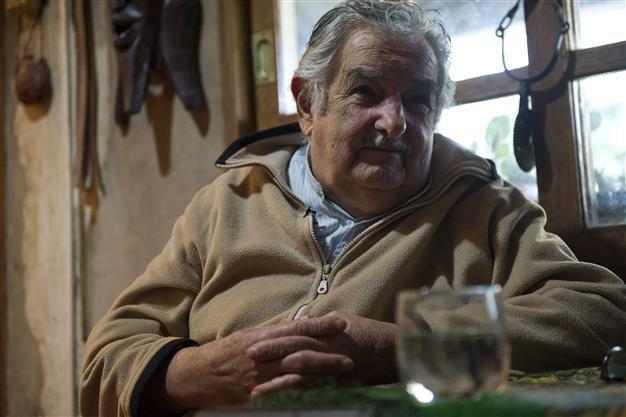Uruguay marijuana sales delayed until 2015: president
MONTEVIDEO - Agence France-Presse

Uruguayan President Jose Mujica listens to questions during an interview with Agence France-Presse at his house, on the outskirts of Montevideo on July 9, 2014. AFP Photo
Uruguay President Jose Mujica told AFP Wednesday that sales of marijuana will be delayed until next year because of difficulties in implementing the controversial law legalizing the drug.
The South American country in December became the first in the world to announce that it would regulate the market for cannabis and its derivatives, a bold move by authorities frustrated with losing resources to fighting drug trafficking.
Direct marijuana sales to consumers will "go to next year," Mujica, 79, said in an interview with AFP. "There are practical difficulties."
Heavily criticized by the United Nations' International Narcotics Control Board (INCB), Uruguay's marijuana experiment is being closely followed by countries eager to find an alternative to the expensive and violent "war on drugs" spearheaded by the United States.
Implementation of the law was supposed to start this year and the government will be in charge of the entire supply chain from growing to sales.
Mujica, a doctor and leftist former guerrilla, could not resist a dig at the United States, where there is a growing momentum in some quarters towards legalizing marijuana.
"If we want to do this sloppily, it is not hard to do that. That's what the United States is doing," the president said.
"But if we want to get this right... we are going to have to do it slowly.
"We are not just going to say, 'hands off and let the market take care of it,' because if the market is in charge, it is going to seek to sell the greatest possible amount," he said.
The new rules state that the officially sanctioned marijuana will have a 15 percent concentration of tetrahydrocannabinol (THC) -- the plant's main psychoactive ingredient -- and come in five varieties.
Buyers must be 18 or older, residents of Uruguay, and must register with the authorities.
"I think we have to do a very methodical trial rollout; that's why we are taking longer. There is a lot to get done, including getting software that works, that really gives the technological tool you want to have," the president said.
Mujica was highly critical of changes in the United States, where the federal government allows individual US states to legalize marijuana, as Colorado and Washington state have done.
"There is another pressure. In the United States, they are liberalizing on drugs, no matter how much they may go on about it. They are liberalizing things with a frightening degree of irresponsibility," Mujica said, referring as well to the use of medical marijuana in 23 US states.
"Now people all of a sudden are so interested in what's new in handling" pot, said Mujica.
"What we are talking about here is not encouraging consumption. There are people who believe we all have the right to get high, until their eyes are crossed. Actually, there is nothing new there; that has always existed as part of mankind's stupidity," Mujica said.
"But if it is kept as such a big mystery, it just turns into the biggest attraction for young people when they are just reaching young adulthood... because people are attracted to whatever is off-limits," he stressed.
The total volume of cannabis consumed in Uruguay would be around 18 to 22 tons a year, National Drug Board secretary general Julio Calzada has said.
Authorities will grow the drug and estimate they will need a maximum of 10 hectares (25 acres) to satisfy demand.
Though it has not been illegal to use marijuana in Uruguay for decades, production and sales of the drug had been outlawed.
If the initiative turns out to be a big failure, Mujica says nothing will have been lost -- "then we will need to go backwards, full steam in reverse, like anything else," he said.
"There is no reason to be extremist about it."
